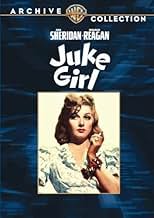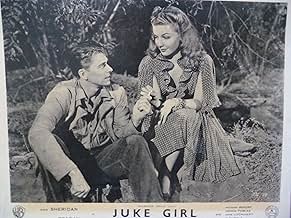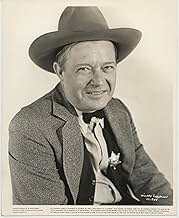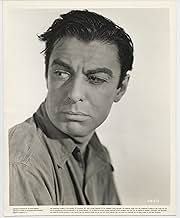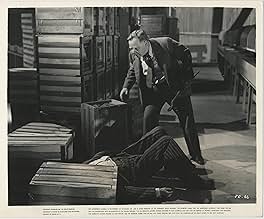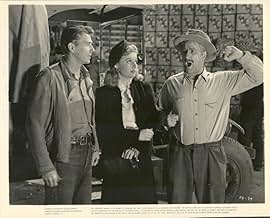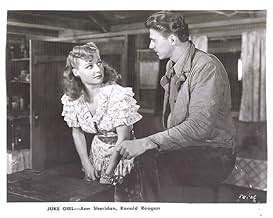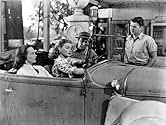Aggiungi una trama nella tua linguaDanny and Steve are migrant farm workers who wind up in Cat Tail, Florida. Cat Tail is run by Madden Packing and Danny works for Madden while Steve works for the underdog farmer named Nick. ... Leggi tuttoDanny and Steve are migrant farm workers who wind up in Cat Tail, Florida. Cat Tail is run by Madden Packing and Danny works for Madden while Steve works for the underdog farmer named Nick. After the Tomato crop is destroyed by Madden, Steve takes Nick, Lola and the next crop to ... Leggi tuttoDanny and Steve are migrant farm workers who wind up in Cat Tail, Florida. Cat Tail is run by Madden Packing and Danny works for Madden while Steve works for the underdog farmer named Nick. After the Tomato crop is destroyed by Madden, Steve takes Nick, Lola and the next crop to Atlanta where they sell it for big money. Danny is going up with Madden and thinks Steve i... Leggi tutto
- Regia
- Sceneggiatura
- Star
- Cully
- (as Howard da Silva)
- Truck Driver
- (scene tagliate)
- Townsman
- (non citato nei titoli originali)
Recensioni in evidenza
The story focuses on two migrant laborers who are following the crop season in Florida and hoping for work. Their rough-and-tumble encounter with the local "boss" (Gene Lockhart, who makes a great villain although I always think of him as Bob Cratchit) breaks up their friendship, and emphasizes the tension between the boss and the farmers who depend on him for money. Reagan's attempts to help a troubled farmer just make Lockhart angrier, leading to escalating violence. Of course, in the meantime, a romance is blooming between Reagan and a local "juke girl" (Sheridan). He wants to settle down, but she's not ready.
Nicely choreographed action sequences, snappy dialog, and memorable major and minor characters make this WB feature worth seeking out.
Juke Girl is a knock-off of The Grapes of Wrath, but without the old folks. In my opinion, Jane Darwell and Charley Grapewin were the only good parts to that movie. Both focus on the struggles of migrant farmers and the poor, common man. Both have handsome leading men who aren't very good actors. But for my money, I'll take Juke Girl. And not just because Reagan has great hair and a lovely smile. Although, that doesn't hurt.
Even though he wasn't a good actor, Reagan seemed to give his best performances when he was paired with Ann Sheridan. I hope they got along; they certainly had good chemistry together. This was made the same year as Kings Row, and it'd make a great double feature. Even though the title implies a silly movie about a dance hall romance, it actually turns dark in the second half. It's a solid drama with a strange title. Yes, Ann Sheridan plays a hardened dance hall girl who captures the heart of an idealistic farmer, but there's a lot more to it than that. Reagan stands up for George Tobias, a Greek farmer who gets pushed around, and that sets off a series of dramatic events. Gene Lockhart plays a real bad guy, coming off another villainous role in Hangmen Never Die. I don't know why he played bad guys so often, except for the reason that he's extremely good at it! Juke Girl might not be Gone With the Wind, but it's definitely one of the better Reagan movies.
This is an interesting film because in many ways it's like a 1940s western...yes, western. While there are no cowboys, the idea of a local boss-man ruining people and using his gang of thugs is very, very common in westerns. It's also interesting to see Reagan playing such a populist sort of role, though it was very much in line with the Reagan of the 1940s (a union man through and through).
So is it any good? Well, for the first 90% of the film, I'd say yes. However, the ending has quite a few problems. Seeing the town inexplicably turn into a lynch mob made little sense--especially when one of Madden's goons is clearly egging them to action. Additionally, Madden's behavior at the very end made little sense--he was evil through all the film--so why would he suddenly do the right thing?! All I know is that it's frustrating to see a good film that folds up at the end of the movie. Worth seeing but it should have been better.
But I want to add a note about Betty Brewer. First, what a personality! Her life seems to have been tragic. Details are shrouded in some mystery, but whenever she pops up in a film, if she doesn't steal the whole movie, she at least sure steals the scenes she's in.
That's why I wish she had made more, and I wish she had stayed active into her adulthood.
The other actors in this enjoyable film mostly did very well for themselves, and for us.
The Reagan-Sheridan team always works magic; Richard Whorf is another of those actors who should have attained more "household-name" status, but he stayed busy in films and television a long time, including directing, apparently right up until his untimely death.
There was a long list of great Warner Brothers actors, including Alan Hale, and others, such as Willie Best, who might not be known as of a particular studio.
Howard da Silva played a bad guy, and every time I see him, I just marvel at his range. His Benjamin Franklin in the movie "1776" was just about perfect.
Ronald Reagan doesn't get much of a break from critics, but in "Juke Girl" he was great. He looked good and his acting was right on.
Ann Sheridan probably could do no wrong.
Together, the actors and the story -- although some of the dialog could have used some work -- create a very good movie.
Just the opposite is true of "Juke Girl," which my wife and I just watched this evening on TCM (March, 2009). I had seen the film quite a while back and didn't think much of it. This time, however, I found the film to be quite enjoyable; no prize winner, but interesting from several standpoints. Here are some quite thoughts:
* The acting: As other reviewers have pointed out, it is quite good. The film features the Warner Brothers stock company that appeared in so many films in the late 30s and throughout the 40s. I refer to the likes of Alan Hale, George Tobias, Donald MacBride, etc. Ronald Reagan and Ann Sheridan are good in the leads.
* Photography: I second the feeling of another reviewer who commented on the film's cinematography. That is especially true of the outdoor scenes, which make up a fair amount of the running time; so many movies from the same year were shot almost entirely on sound stages. It's nice to see what Southern California looked like in the early 1940s (I feel certain that somewhere such as the San Fernando Valley stood in for Florida.)
* Politics: This story almost seems like a second tier version of the "Grapes of Wrath," with its mean, unscrupulous packing house owner and its poor but honest farmers and field workers. It's laid on a bit thick in my view, but it makes for an intriguing storyline.
* One quibble regarding plot: When the mob storms the jail, the sheriff and his deputies, who have threatened to shoot, just stand there and allow themselves to be overcome. Well, I suspect that any self-respecting lawman and his men would have blasted away at that point in their own self-defense if nothing else.
I have no doubt that some will, incorrectly, call this a B movie. Well, with Ann Sheridan as the top billed player, that is of course nonsense. It is indeed an A production, though a bit too predictable in terms of the plot to be considered first-rate. However, if you are a fan of 1940s style Warner Brothers melodramas (and I don't use that term pejoratively), you might indeed enjoy "Juke Girl."
Lo sapevi?
- QuizIda Lupino was considered for the part, but the actress felt her accent made it an inappropriate role.
- BlooperIn the early scene at the gas station, which is supposed to be somewhere in Florida, the hills of California can clearly be seen in the background.
- Citazioni
Danny Frazier: The body's familiar but I can't place the face.
Lola Mears: I never forget a face but for you I'll make an exception.
- ConnessioniFeatured in This Theatre and You (1949)
- Colonne sonoreI Hates Love
(1942) (uncredited)
Music by M.K. Jerome
Lyrics by Jack Scholl
Played during the opening credits
Also played at Muckeye's and sung by Ann Sheridan (uncredited)
Played often in the score
I più visti
- How long is Juke Girl?Powered by Alexa
Dettagli
- Tempo di esecuzione1 ora 30 minuti
- Colore
- Proporzioni
- 1.37 : 1
Contribuisci a questa pagina



